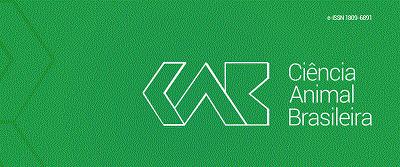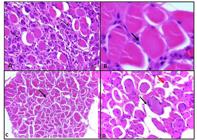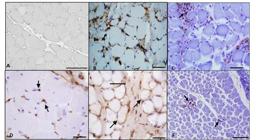Abstract
Muscular dystrophies are hereditary diseases that lead to progressive degeneration of the skeletal musculature. Golden Retriever dogs are used as animal models because they show a hereditary muscle disease similar to muscular dystrophy in humans. Aims: To evaluate the immunostaining of M1 (CD68) and M2 (CD163) macrophages, MHC I, MHC II and, utrophin in muscles of Golden Retriever dogs affected by muscular dystrophy (GRMD). Methods: Samples from 17 male dogs affected by GRMD were divided into GI - dystrophic dogs up to one year of age; and GII - dystrophic dogs over one-year-old. Results: Immunostaining of CD163 was higher than CD68 in both GI and GII. CD68 showed no variation between groups of dystrophic animals. MHC class I immunostaining was most evident in the biceps femoris and triceps brachialis. MHC class II was expressed mildly in four dystrophic muscle types in GI and GII. Utrophin immunostaining was higher in GII. Conclusion: M2 macrophages were one of the main mononuclear inflammatory cells found in dystrophic muscles. The number of M2 in muscles of dogs with GRMD increases with age, linking this cell subtype to permanent muscle damage.
Keywords:
Golden Retriever Muscular Dystrophy (GRMD); immunohistochemistry; inflammation; myopathy; muscle

 Thumbnail
Thumbnail
 Thumbnail
Thumbnail
 Thumbnail
Thumbnail
 Thumbnail
Thumbnail
 Thumbnail
Thumbnail
 Thumbnail
Thumbnail
 Thumbnail
Thumbnail






